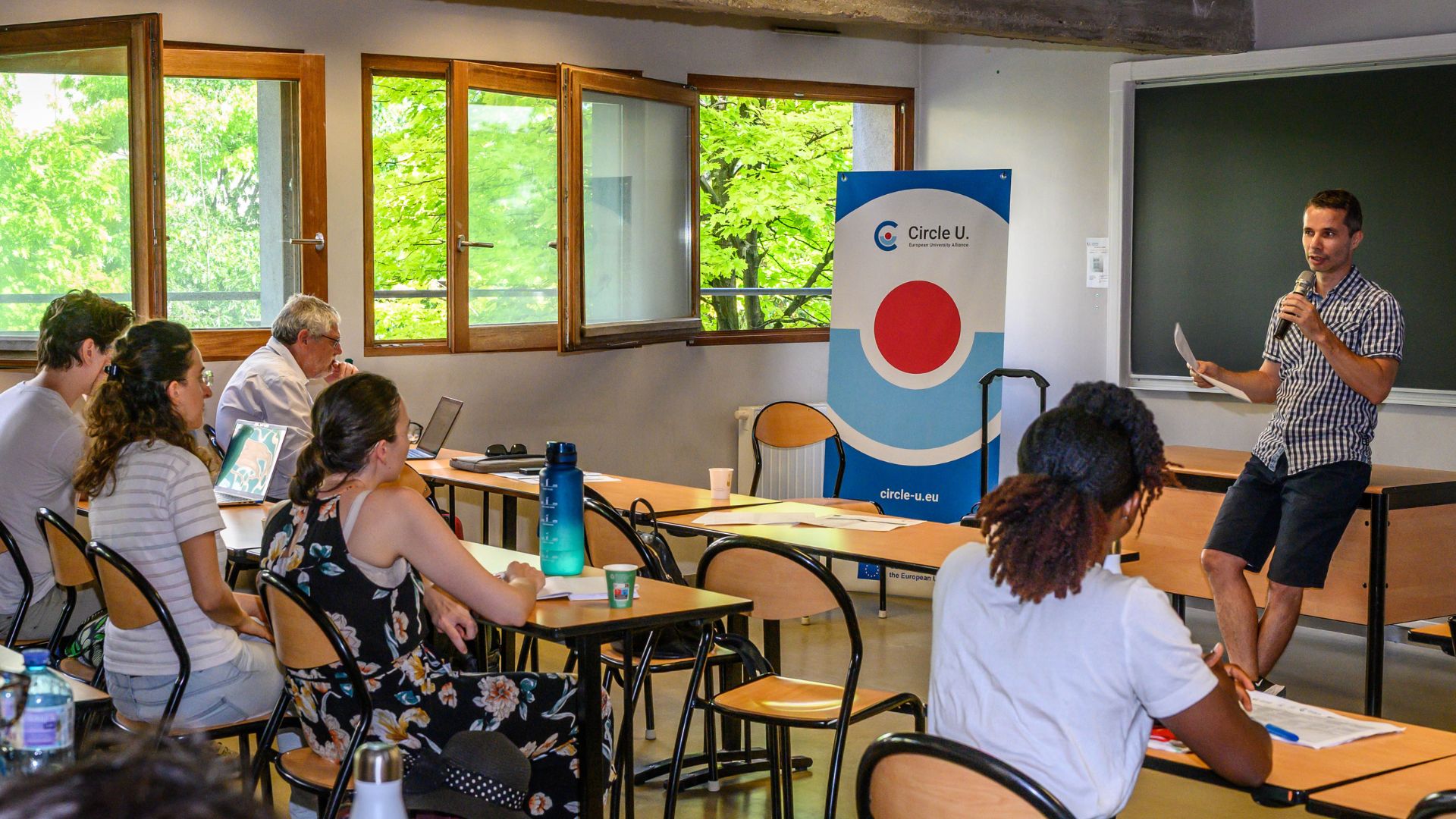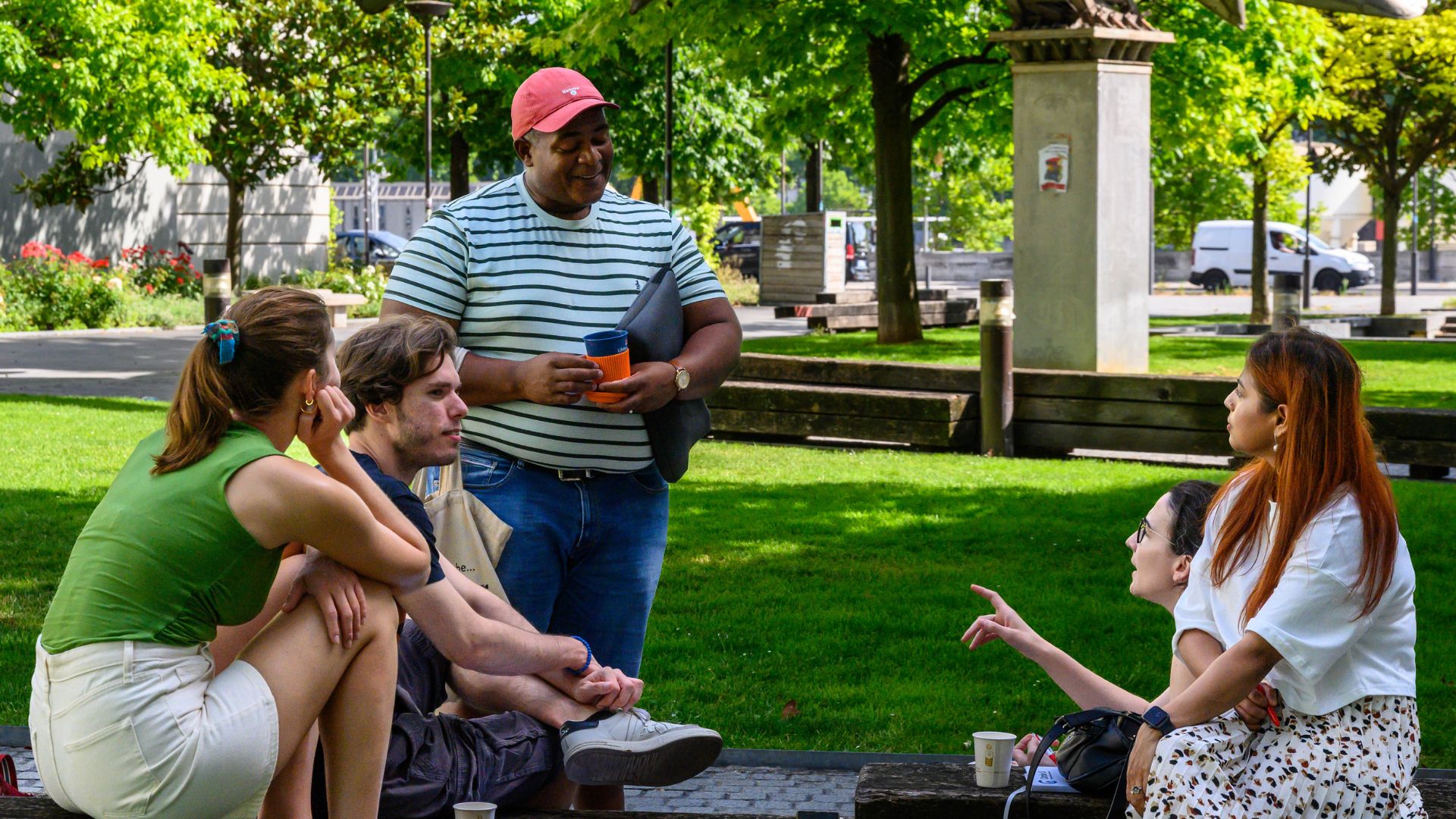ECTS
120 crédits
Niveau d'études visé
BAC +5 (niveau 7)
Durée
2 ans
Faculté
Faculté Sciences & Faculté Sociétés et Humanités
Langue des enseignements
Anglais
Présentation
The Master in Cognitive Science cog-SUP
- An interdisciplinary and collaborative master’s program in Cognitive Science, taught in English. We offer a very broad interdisciplinary openness and a fundamentally collaborative spirit, bringing together professors, researchers and students from very different backgrounds, united by common research questions. The big majority of courses are in English (except otherwise stated).
- A master’s program structured around a unified core curriculum complemented by robust disciplinary tracks. To maintain a well-balanced and foundationally sound interdisciplinary education, Cog-SUP is organized into six tracks:
– Psychology
– Philosophy
– Computational linguistics
– Neuroscience
– Computational neuroscience and artificial intelligence
– Cognitive science and society
These tracks ensure the acquisition of genuine expertise in the concepts, methods, and techniques specific to each discipline, enhancing the clarity of skills associated with the diploma. The program establishes a common cultural foundation from the first year (M1) through a core curriculum and introductory courses to the different disciplines. In the second year (M2), the majority of courses are fully interdisciplinary and open to students from all tracks. Our goal is to cultivate cognitivists equipped with both robust disciplinary expertise and a broad interdisciplinary culture, essential elements for fostering meaningful collaboration across disciplines.
- A master’s degree focused on field experience. In all tracks, a field placement (lab or other) is compulsory already during the M1 year. Half of M2 validation is based on a long internship that takes up the entire second semester. Internships can take place in any laboratory of your choice, whatever its affiliation. The only prerequisites are that the internship be relevant to cognitive science themes, and that the host laboratory be a reliable partner. The same applies to internships in the private sector or in government agencies. This site [link] lists a number of internship opportunities common to the parisian Masters programs in cognitive science.
- Innovative teaching methods, new contents addressing contemporary issues. Cognitive science and educational science have widely demonstrated the positive effects of active pedagogies on learning. We use innovative teaching methods such as flipped classrooms or problem-based and project-based learning. In terms of content, cog-SUP also provides a unique offering of courses, including classic themes as well as new ones that are not available elsewhere in France. Examples include compulsory multidisciplinary courses in the ethics of cognition in M1, and computational psychiatry, among others.
- A master program attentive to the human, ecological, societal and ethical issues of cognitive science: Our understanding of human and animal cognition, as well as the development of artificial intelligence, are experiencing a boom that has no precedent in the history of humanity. Cognitive science plays a central role in this development. Society’s expectations of cognitive science are therefore very high, and in return imply great responsibilities. Our curriculum addresses current major issues in cognitive science on ecological transition, mental health, education, artificial intelligence, etc., while providing bases for ethical reflection. Our goal is to train researchers and cognitivists aware of their potential but also of their responsibilities and limits, and attentive to human values.
- A master that promotes scientific excellence within a French open university model: Université Paris Cité and Sorbonne Université are two major universities in Paris. These universities are heirs to a rich tradition in core disciplines of cognitive science, neuroscience, psychology, philosophy, artificial intelligence… with prestigious pioneers of these disciplines such as Jean-Martin Charcot, Paul Broca, Alfred Binet, and, more recently, Yann LeCun. cog-SUP is in keeping with the spirit of French universities, which aims to allow all those who wish to do so and who demonstrate their academic qualities to access the best training from the best specialists in the field.
Programme
The master’s student must register to one of the tracks. These tracks ensure the acquisition of genuine expertise in the concepts, methods, and techniques specific to each discipline, enhancing the clarity of skills associated with the diploma. The program establishes a common cultural foundation from the first year (M1) through a core curriculum and introductory courses to the different disciplines. In the second year (M2), the majority of courses are fully interdisciplinary and open to students from all tracks. Our goal is to cultivate cognitivists equipped with both robust disciplinary expertise and a broad interdisciplinary culture, essential elements for fostering meaningful collaboration across disciplines.
Sélectionnez un programme
Master Sciences cognitives - Parcours : Linguistique Computationnelle / Computational Linguistics
General cog-SUP organization
The master’s student must register to one of the tracks. These tracks ensure the acquisition of genuine expertise in the concepts, methods, and techniques specific to each discipline, enhancing the clarity of skills associated with the diploma. The program establishes a common cultural foundation from the first year (M1) through a core curriculum and introductory courses to the different disciplines. In the second year (M2), the majority of courses are fully interdisciplinary and open to students from all tracks. Our goal is to cultivate cognitivists equipped with both robust disciplinary expertise and a broad interdisciplinary culture, essential elements for fostering meaningful collaboration across disciplines.
Specific to the track Computational Linguistics
The Computational Linguistics track provides comprehensive training in the models and methods of natural language processing, from the linguistic and mathematical foundations of deep neural networks to the applications of large language models for information access, dialog systems, and machine translation. Its position within the cog-SUP Master’s program in Cognitive Sciences, offers a unique gateway to computational psycholinguistics and neurolinguistics, allowing exploration of the interfaces between language, perception, memory and action, with applications in robotics and human-machine interaction. At the end of their training, students will have a thorough understanding of the concepts, methods and techniques of natural language processing and artificial intelligence, and their implementation in advanced language information processing systems.
The courses on offer cover a wide range of topics, from linguistic modeling in phonology, syntax and semantics, to the algorithmic foundations of language processing, speech processing and deep learning – in the first year; the second year offers more in-depth studies in psycholinguistics and computational field linguistics on the one hand, and in more applied fields such as machine translation, text mining, dialogue systems and information retrieval on the other hand. Students can also choose elective courses offered in other Masters programs offered by partner universities, to further enrich and/or specify their knowledge.
The Computational Linguistics track thus offers a unique opportunity to acquire in-depth experimental and modeling expertise in the field of natural language processing, a central theme of generative artificial intelligence, whose applications are having a major impact on the current digital transitions that are transforming our societies.
Students who graduate from this program are likely to take up positions in artificial intelligence research and development teams in the public or private sector (from large international corporations to SMEs and start-ups) and also in data driven linguistics. Their education will prepare them to work effectively in highly multidisciplinary environments.
Master Sciences cognitives - Parcours : Neurosciences Cognitives / Cognitive Neuroscience
General cog-SUP organization
The master’s student must register to one of the tracks. These tracks ensure the acquisition of genuine expertise in the concepts, methods, and techniques specific to each discipline, enhancing the clarity of skills associated with the diploma. The program establishes a common cultural foundation from the first year (M1) through a core curriculum and introductory courses to the different disciplines. In the second year (M2), the majority of courses are fully interdisciplinary and open to students from all tracks. Our goal is to cultivate cognitivists equipped with both robust disciplinary expertise and a broad interdisciplinary culture, essential elements for fostering meaningful collaboration across disciplines.
Specific to the track Cognitive Neuroscience
The central question addressed in the cog-SUP cognitive neuroscience track is the link between the biological activity of the nervous system and cognitive and mental activity. In addition to the master’s core curriculum, students in this track acquire a solid grasp of concepts and methods in experimental psychology, which is essential for experimentation in cognitive neuroscience, a solid grasp of concepts and methods in neuropsychology (the study of cognitive deficits in relation to neural lesions or pathologies), and advanced mastery of the full range of imaging and recording techniques used in cognitive neuroscience, from electrophysiology to functional MRI. The curriculum is primarily focused on human cognition but also provides an opportunity to explore approaches using animal models.
Beyond mastering the methods, the topics cover a very wide range of cognitive functions, encompassing their normal, pathological and developmental aspects. Students complete a research internship in the laboratory during both the first (M1) and second (M2) years of the program. In M1, the internship is carried out on a weekly basis (with a minimum of one day per week over one semester). In M2, it takes place throughout the entire second semester, enabling opportunities for internships abroad.
On completion of this program, students will be able to understand and interpret the scientific literature in cognitive neuroscience, carry out a literature review, develop an experimental protocol, acquire and analyze neuroimaging data and write a scientific article. These skills mainly pave the way for pursuing a PhD, but can also be put to good use in other career paths where a mastery of cognitive neuroscience and scientific methods are required (public administrations and companies or the private sector).
Master Sciences cognitives - Parcours : Neurosciences Computationnelles et Intelligence Artificielle / Computational Neuroscience and Artificial Intelligence
General cog-SUP organization
The master’s student must register to one of the tracks. These tracks ensure the acquisition of genuine expertise in the concepts, methods, and techniques specific to each discipline, enhancing the clarity of skills associated with the diploma. The program establishes a common cultural foundation from the first year (M1) through a core curriculum and introductory courses to the different disciplines. In the second year (M2), the majority of courses are fully interdisciplinary and open to students from all tracks. Our goal is to cultivate cognitivists equipped with both robust disciplinary expertise and a broad interdisciplinary culture, essential elements for fostering meaningful collaboration across disciplines.
Specific to the track Computational Neuroscience and Artificial Intelligence
Training
The Computational Neuroscience and Artificial Intelligence (CNIA) program provides comprehensive interdisciplinary training at the intersection of cognitive sciences, computational neuroscience, and artificial intelligence. By combining rigorous theoretical approaches and advanced digital tools, this program aims to develop experts capable of modeling and analyzing the natural and artificial mechanisms of cognition.
Prerequisites
This program is designed for students with a dual skillset or strong interest in complementary disciplines. Ideal profiles include:
– Students in mathematics or computer science with an interest for neurosciences, psychology or biology.
– Or conversely, students in neurosciences, psychology or biology with training in mathematical and computational tools.
Career Opportunities
Graduates of the Computational Neuroscience and AI program will be equipped for diverse careers in:
– Academic and applied research (computational neuroscience, AI, cognition).
– Tech industries (AI, data processing, digital health).
– Expertise in technology and data ethics.
Master Sciences cognitives - Parcours : Philosophie / Philosophy
General cog-SUP organization
The master’s student must register to one of the tracks. These tracks ensure the acquisition of genuine expertise in the concepts, methods, and techniques specific to each discipline, enhancing the clarity of skills associated with the diploma. The program establishes a common cultural foundation from the first year (M1) through a core curriculum and introductory courses to the different disciplines. In the second year (M2), the majority of courses are fully interdisciplinary and open to students from all tracks. Our goal is to cultivate cognitivists equipped with both robust disciplinary expertise and a broad interdisciplinary culture, essential elements for fostering meaningful collaboration across disciplines.
Specific to the track Philosophy
The philosophy track proposes a balanced program, based on solid disciplinary foundations (in ethics, logic, epistemology, philosophy of cognitive science, philosophy of biology), while also providing cutting-edge knowledge in the main fields of cognitive science (automatic language processing, cognitive psychology, cognitive neuroscience, computational neuroscience and AI).
In addition to content-based courses, we offer the opportunity to acquire skills in data processing (data camp, programming), experimental methods and neuroimaging.
Our students can complete a laboratory internship if they wish to carry out an interdisciplinary project with an experimental aspect, or write a philosophical dissertation, in both their first and second years.
Graduates of this program can pursue a doctorate in cognitive science, philosophy of mind, epistemology, philosophy of science, or move into the many careers where the argumentative and experimental skills we impart are valued.
Master Sciences cognitives - Parcours : Psychologie / Psychology
General cog-SUP organization
The master’s student must register to one of the tracks. These tracks ensure the acquisition of genuine expertise in the concepts, methods, and techniques specific to each discipline, enhancing the clarity of skills associated with the diploma. The program establishes a common cultural foundation from the first year (M1) through a core curriculum and introductory courses to the different disciplines. In the second year (M2), the majority of courses are fully interdisciplinary and open to students from all tracks. Our goal is to cultivate cognitivists equipped with both robust disciplinary expertise and a broad interdisciplinary culture, essential elements for fostering meaningful collaboration across disciplines.
Specific to the track Psychology
The Psychology track aims to train the new generation of cognitive psychologists in classic methods and approaches (behavior, psychophysics, signal detection theory, etc), augmented by solid training in modern scientific methods that psychology has adopted and contributed to creating through its interactions with the other cognitive sciences (brain imaging, cognitive modeling, etc).
This goal is achieved through methods and content classes, as well as internships in research laboratory during both the M1 and M2 years. Training in statistics and experimental design is also guaranteed by the core curriculum, and students can also choose from external courses to further enrich and/or specify their knowledge.
Students graduating from this program may go on to perform a PhD in cognitive science and psychology, or turn towards more applied settings in which experimental design and research methodology are crucial skills.
Master Sciences cognitives - Parcours : Sciences Cognitives et Société / Cognitive Science and Society
General cog-SUP organization
The master’s student must register to one of the tracks. These tracks ensure the acquisition of genuine expertise in the concepts, methods, and techniques specific to each discipline, enhancing the clarity of skills associated with the diploma. The program establishes a common cultural foundation from the first year (M1) through a core curriculum and introductory courses to the different disciplines. In the second year (M2), the majority of courses are fully interdisciplinary and open to students from all tracks. Our goal is to cultivate cognitivists equipped with both robust disciplinary expertise and a broad interdisciplinary culture, essential elements for fostering meaningful collaboration across disciplines.
Specific to the track Cognitive Science and Society
The Cognitive Sciences and Society track explores human cognitive processes and social dynamics within our society. It offers an interdisciplinary approach, combining all the disciplines of the cognitive sciences (psychology, neuroscience, philosophy, linguistics, AI…) as well as other fields that can feed or be fed by the cognitive sciences (design, urbanism…). This course provides a solid methodological and theoretical background, with an emphasis on the concrete applications and reflections of cognitive science in fields such as education, health, ecological transition and public policy. This training enables critical and in-depth analysis of societal issues in the light of evidence-based data, and to provide scientifically valid and/or informed solutions within an ethical framework.
Admission
Pré-requis
Minimum requirements for application
- An undergraduate diploma in one of the foundational disciplines of cognitive science, coherent with the major to which you will apply: Psychology, Biology, Philosophy, Linguistics, Mathematics, Physics, Computer Science OR An equivalent to M1 level within an engineering curriculum or a medicine curriculum.
- Other backgrounds may be eligible and are considered on a case-by-case basis.
- Minimum English level equivalent to C1
https://rm.coe.int/CoERMPublicCommonSearchServices/DisplayDCTMContent?documentId=090000168045bb52 - Knowledge of the French language is not required for the admissions nor for courses, but it is important to have basics of French for your everyday life in Paris.
Référentiel
Référentiel RNCP
38967
Contacts
- Secrétariat pédagogique
Dernière mise à jour le 3 février 2026
A lire aussi
À l’occasion de la Semaine nationale des Cordées de la réussite 2026, l’Université Paris Cité réaffirme son engagement en faveur de la démocratisation de l’accès à l’enseignement supérieur à travers des actions concrètes, innovantes et ancrées dans les territoires.
Étudiantes et étudiants de l’Université Paris Cité, nous vous donnons rendez-vous le jeudi 19 mars 2026 pour la 2ᵉ édition de cet événement annuel dédié à l’emploi, aux stages et à l’alternance. Près de 30 recruteurs seront présents pour vous proposer des opportunités concrètes et des conseils personnalisés afin de faciliter votre insertion professionnelle. Nouveauté cette année : le Forum des métiers de la transition écologique et de la solidarité vous invitera à réfléchir aux enjeux de l’engagement écologique et solidaire dans le monde du travail au travers de conférence, ateliers et tables rondes.
Vous étudiez à l’Université Paris Cité et vous souhaitez profiter de vos vacances d’été pour renforcer votre CV tout en découvrant un nouveau pays ? Notre université est membre de l’alliance européenne Circle U. et vous permet, à travers son campus ouvert, de candidater gratuitement aux écoles d’été organisées chaque année. Plusieurs thématiques transverses sont abordées comme la Santé Globale, le Climat, la Démocratie ou le Multilinguisme par exemple. Les candidatures sont ouvertes jusqu’au 28 février, renseignez-vous !
Vous êtes doctorant ou doctorante à l’Université Paris Cité et vous souhaitez étendre votre réseau et vos connaissances en Santé Globale ? L’alliance européenne Circle U. vous invite à participer à la nouvelle édition de son école d’été « New avenues for Global Health » qui aura lieu du 6 au 11 juillet 2026 dans les locaux de notre université ! Les candidatures sont acceptées jusqu’au 28 février.







